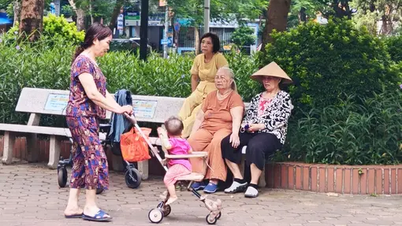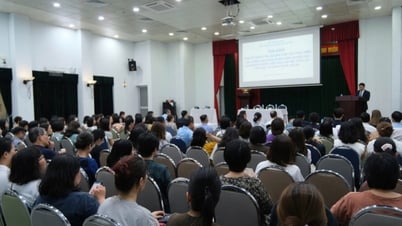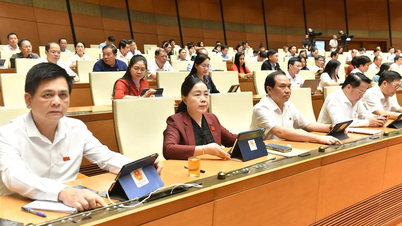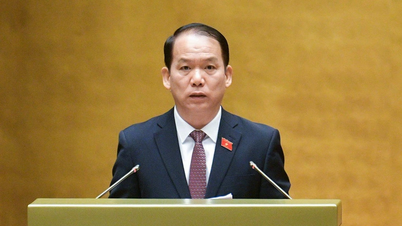
Building a comprehensive solution to protect workers' rights when amending the Law on Social Insurance. Photo: Tay Son
Continuing the program of the 7th session of the 15th National Assembly, on the morning of May 27, the National Assembly will discuss in the hall a number of contents with different opinions of the draft Law on Social Insurance (amended). Before the discussion, Member of the National Assembly Standing Committee, Chairwoman of the National Assembly's Social Affairs Committee Nguyen Thuy Anh presented a Report on explanation, acceptance and revision of the draft Law on Social Insurance (amended). After the National Assembly discussed, the presenting agency and the agency in charge of the review coordinated to explain and clarify a number of issues raised by National Assembly deputies. One of the issues that many people are interested in is still how to design the one-time withdrawal of social insurance in the most reasonable way. Since the time the draft Law on Social Insurance was put out for comments, this has also been an issue that has received many comments from both experts and workers. The draft revised Social Insurance Law is proposing two options for one-time withdrawal of Social Insurance: Option 1, employees who have been off work for 12 months and want to withdraw Social Insurance in one time. Option 2, employees can only withdraw Social Insurance for no more than 50% of the total time they have contributed to the pension and death fund. In the Submission to the National Assembly, the Government said that in the 7 years of implementing the Social Insurance Law in 2014, there were over 476,000 people receiving one-time Social Insurance who had participated in Social Insurance for over 10 years and were aged 40 and older. In addition, there were over 53,000 people who had passed the working age and had to receive one-time Social Insurance because they had not yet paid 20 years of compulsory Social Insurance; there were over 20,000 people who, upon reaching retirement age, had not yet paid enough time and had to pay one-time for the remaining time to receive a pension. If the minimum time to receive a pension is still stipulated to be 20 years, these people will have little chance of receiving a pension. Therefore, reducing the minimum number of years of contribution to 15 years will create opportunities for late participants (starting participation at 45-47 years old) or those who participate intermittently, leading to not having accumulated 20 years of social insurance contributions when reaching retirement age, to receive monthly pensions instead of receiving one-time social insurance. With the above regulations, the pension level of these people may be lower than that of those with a long period of contribution if the salary used as the basis for compulsory social insurance contributions or the income used as the basis for voluntary social insurance contributions is the same. However, these cases were not previously eligible for pensions, they received one-time social insurance contributions (if they did not choose to voluntarily pay one-time contributions for the missing period), now they will have the opportunity to receive monthly pensions. Thus, even though the pension level may be more modest than those with a long period of contribution, with a stable monthly pension, periodically adjusted by the State and entitled to health insurance, the life of workers when they retire will be more secure.Laodong.vn
Source: https://laodong.vn/thoi-su/quoc-hoi-thao-luan-phuong-an-rut-bhxh-mot-lan-thoi-gian-dong-bao-hiem-1345071.ldo



![[Photo] Solemn opening of the 8th Congress of the Central Public Security Party Committee, term 2025-2030](https://vphoto.vietnam.vn/thumb/1200x675/vietnam/resource/IMAGE/2025/10/4/f3b00fb779f44979809441a4dac5c7df)

![[Photo] General Secretary To Lam attends the 8th Congress of the Central Public Security Party Committee](https://vphoto.vietnam.vn/thumb/1200x675/vietnam/resource/IMAGE/2025/10/4/79fadf490f674dc483794f2d955f6045)
![[Photo] Bustling Mid-Autumn Festival at the Museum of Ethnology](https://vphoto.vietnam.vn/thumb/1200x675/vietnam/resource/IMAGE/2025/10/4/da8d5927734d4ca58e3eced14bc435a3)
























































![[VIDEO] Summary of Petrovietnam's 50th Anniversary Ceremony](https://vphoto.vietnam.vn/thumb/402x226/vietnam/resource/IMAGE/2025/10/4/abe133bdb8114793a16d4fe3e5bd0f12)
![[VIDEO] GENERAL SECRETARY TO LAM AWARDS PETROVIETNAM 8 GOLDEN WORDS: "PIONEER - EXCELLENT - SUSTAINABLE - GLOBAL"](https://vphoto.vietnam.vn/thumb/402x226/vietnam/resource/IMAGE/2025/7/23/c2fdb48863e846cfa9fb8e6ea9cf44e7)




























Comment (0)